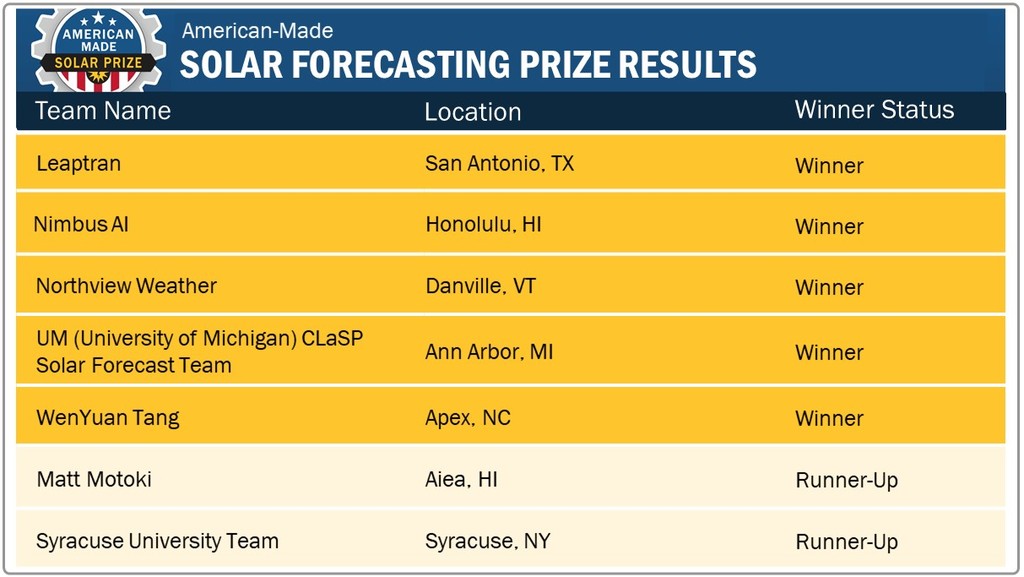Congratulations to the Solar Forecasting Prize winners and runners-up, announced by the Tassos Golnas, Solar Forecasting Prize Lead in the Solar Energy Technologies Office, during the CMU Energy Week Virtual Networking Mixer!
The five winners and two runners-up were selected based on their performance in the forecast evaluation period as well as the quality of their commercialization plans, which proposed innovative solutions for deployment. Each winner was awarded $50,000 in cash prizes, while runners-up earned $25,000 each.

Please join us in congratulating the following winners and runners-up:
Solar Forecasting Prize Winners
- Leaptran - San Antonio, TX
Integrated Solar Forecasting Solutions
This team used crowd-sourced weather data and algorithms, leveraging site-specific data fusion, to achieve intra-day and days-ahead solar forecasting. This model offered a >50% improvement of days-ahead, intra-hour, and intra-day solar forecasting accuracy by integrating asset-level data. - Nimbus AI - Honolulu, Hawaii
Fast Solar Forecasting with Machine Learning
This team developed a fast and inexpensive system for geographically flexible, hyper-local day-ahead probabilistic solar forecasting. The team combined historical ground- and satellite-based instrument data with physics-based numerical weather prediction (NWP) techniques to produce probabilistic forecasts. - Northview Weather - Danville, VT
Determining Who Wins the Cumulus vs. Stratus Battle
This team developed a solar forecasting method that uses a mesoscale weather forecast model to produce a dynamically based spread of probabilistic solar power forecast information. Probabilistic information is also tuned blending statistical information and machine learning of historic sky cover observations. - UM (University of Michigan) CLaSP - Ann Arbor, MI
A Novel Hybrid Approach for Solar Forecasting
This team developed a hybrid solar forecasting method using ground horizontal irradiance based on a recursive neural network (RNN), trained with past observations and a weather-regime-dependent empirical bias correction scheme. The team based this scheme on the RNN output and the multi-day weather forecast made from NWP. - WenYuan Tang - Apex, North Carolina
A Hybrid Approach to Probabilistic Forecasting
This team developed a simple (low-data-cost and low-computational-cost) yet effective solar forecasting method that includes learning from many base models, as well as physical and statistical models, to provide a comprehensive tool for both forecasting and grid optimization. This team provided a simple yet effective model that is easy to interpret, train, validate, and deploy, thus overcoming the barriers of experimentation and adoption by utilities and other end users.
Solar Forecasting Prize Runners-up:
- Matt Motoki - Aiea, Hawaii
RadianceIQ
This team developed an advanced machine learning technique for probabilistic forecasting that utilizes custom deep neural networks to directly minimize the Continuous Ranked Probability Score (CRPS) loss with no post-processing calibration needed. This method allowed for greater accuracy and its lightweight architecture allows it to run faster than NWP ensembles and other machine learning approaches. - Syracuse University Team - Syracuse, NY
Weather Adaptive Probabilistic Solar Forecast
This team developed a weather-adaptive probabilistic day-ahead solar forecast methodology that leverages innovations in machine learning and statistics. This model could adapt to different weather patterns for an accurate forecast under varying weather conditions.
Congratulations to these teams for their outstanding work in the Solar Forecasting Prize!

